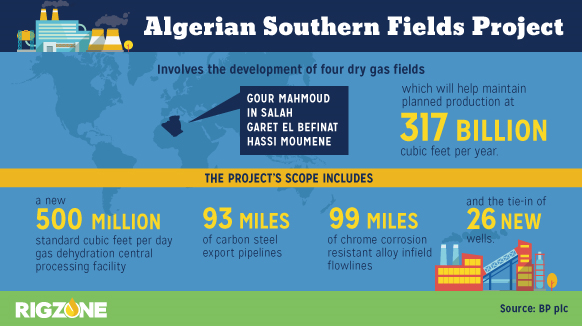Statoil, BP Remain Committed to Algeria Despite Violence

Statoil ASA and BP plc say they will remain in Algeria despite militant attacks on their joint oil and gas operations in the country over the last few years, following the implementation of improved safety measures.
“Algeria has been an important country for Statoil in many years, and we have a long term perspective in the country,” Knut Rostad, Statoil’s media contact for international exploration and field development, told Rigzone.

BP echoed Statoil’s allegiance to the North African oil producer, with a company spokesperson stating that it has a “long history in Algeria and remains committed to Algeria.”
Highlighting their long-term engagement in the country, the European oil and gas firms in February announced the recent start-up of the Southern Fields project in Algeria, which is the latest stage in the development of seven gas fields in the country.
The Southern Fields project involves the development of four dry gas fields - Gour Mahmoud, In Salah, Garet el Befinat and Hassi Moumene - which will help maintain planned production at 317 billion cubic feet per year. The joint venture began a project to drill 26 southern field wells in Algeria in 2014 and plans are in place to meet this objective by 2018.
The project’s scope includes a new 500 million standard cubic feet per day gas dehydration central processing facility close to Hassi Moumene, brownfield modifications to existing processing facilities at the Reg, Teguentour and Krechba fields, 93 miles of carbon steel export pipelines, 99 miles of chrome corrosion resistant alloy infield flowlines and the tie-in of the 26 new wells.
Militant Attacks on Oil, Gas Facilities in Algeria
In March, Al Qaeda’s North Africa branch attacked the In Salah gas facility, in the northern region of Krechba, with rocket propelled grenades from outside the site perimeter.
The attack resulted in no casualties or damage at the plant, according to a Reuters report, but the facility was closed as a precaution. Following the attack on the site, Statoil and BP withdrew workers from their Algerian assets.
“We will continuously adapt the manning to the security situation and contribute to an efficient production, from other locations or at the facilities, but we do not want to give any further details,” said Rostad.
BP temporarily relocated its staff from the In Salah Gas and In Amenas joint venture sites as a precautionary measure, with a limited number remaining in country, a company spokesperson said. Other BP staff are working remotely while the JV and shareholder teams continue to assess the implications of the attack.
The attack on In Salah followed a terrorist assault on the In Amenas gas plant in Algeria in January 2013, which was unprecedented in the industry in terms of force and scale, a BP spokesperson told Rigzone.
Forty workers died during the crisis, which included a hostage situation after Islamist militants attempted to take over the facility.
“The security measures in place at the time of the attack were reasonable and adequate. However, the unprecedented and unforeseeable nature of the attack overwhelmed the security system in place,” said a BP spokesperson.
Before the attack, In Amenas supplied around 11.5 percent of Algeria's total natural gas output. This figure was equivalent to 317 billion cubic feet of gas per year.
Lessons Learned From In Amenas Terrorist Attack
The lessons learned from the 2013 In Amenas attack went some way toward limiting the damage of the recent In Salah raid, said Statoil’s Rostad.
Statoil’s board investigated the In Amenas attack, which gave 19 recommendations within specific areas of security at In Amenas and other facilities in Algeria.
The investigation team conducted 136 interviews and a series of meetings with relevant external and internal players as part of the follow up operations. As a result, Statoil strengthened its management, skills and capacity within risk analysis, security evaluation and security work and improve management systems and work processes within safety and security.
Statoil also implemented a closer integration of work related to physical, personnel and IT security, along with more training and increased standardization within emergency preparedness. Strengthened cooperation with public authorities, in Norway and abroad, and in the industry's own networks and organisations within areas such as intelligence, safety and security analysis and actions, was also encouraged.
“Since the In Amenas attack, Statoil has worked thoroughly to implement the recommendations from the investigation. That includes improving physical security measures at our facilities in Algeria, training and the organizational follow up,” said Rostad.
“Safety for our personnel is priority number one. The security situation in the region (North Africa) has been challenging for the last years and we are continuously monitoring the developments to understand the risk picture, which is dynamic, in close dialogue with our partners.”

WHAT DO YOU THINK?
Generated by readers, the comments included herein do not reflect the views and opinions of Rigzone. All comments are subject to editorial review. Off-topic, inappropriate or insulting comments will be removed.
- How Likely Is an All-Out War in the Middle East Involving the USA?
- Rooftop Solar Now 4th Largest Source of Electricity in Australia
- US Confirms Reimposition of Oil Sanctions against Venezuela
- EU, Industry Players Ink Charter to Meet Solar Energy Targets
- Analyst Says USA Influence on Middle East Seems to be Fading
- Russian Ships to Remain Banned from US Ports
- Brazil Court Reinstates Petrobras Chair to Divided Board
- EIB Lends $425.7 Million for Thuringia's Grid Upgrades
- Var Energi Confirms Oil Discovery in Ringhorne
- Seatrium, Shell Strengthen Floating Production Systems Collaboration
- An Already Bad Situation in the Red Sea Just Got Worse
- What's Next for Oil? Analysts Weigh In After Iran's Attack
- USA Regional Banks Dramatically Step Up Loans to Oil and Gas
- EIA Raises WTI Oil Price Forecasts
- How Likely Is an All-Out War in the Middle East Involving the USA?
- Venezuela Authorities Arrest Two Senior Energy Officials
- Namibia Expects FID on Potential Major Oil Discovery by Yearend
- Oil Markets Were Already Positioned for Iran Attack
- Is The Iran Nuclear Deal Revival Project Dead?
- Petrobras Chairman Suspended
- Oil and Gas Executives Predict WTI Oil Price
- An Already Bad Situation in the Red Sea Just Got Worse
- New China Climate Chief Says Fossil Fuels Must Keep a Role
- Oil and Gas Execs Reveal Where They See Henry Hub Price Heading
- Equinor Makes Discovery in North Sea
- Macquarie Strategists Warn of Large Oil Price Correction
- DOI Announces Proposal for Second GOM Offshore Wind Auction
- Standard Chartered Reiterates $94 Brent Call
- Chevron, Hess Confident Embattled Merger Will Close Mid-2024
- Analysts Flag 'Remarkable Feature' of 2024 Oil Price Rally


